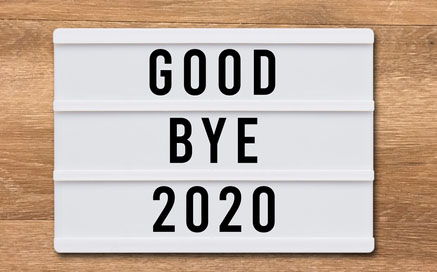I’ll jump on the bandwagon of people saying “Thank goodness 2020 is almost over!” Yes, it’s been a tough year. But the end of any year brings forth the hope for the coming year to be better, and for all of us to try and become better people. That’s where New Year’s Resolutions come in!
And who doesn’t like making a good New Year’s resolution? (OK, so most of them don’t pan out, but it’s worth a shot, right?)
Since many people are concerned about money issues, let’s look at some financially focused resolutions.
We’d like to note that every individual’s circumstances are different; so, some – or all – of these resolutions may not work for you.
What are some of your New Year’s resolutions? Tell us in the Comments section toward the bottom of this page.
According to a recent survey by wallethub.com, more than 97 million Americans are likely to make financial New Year’s resolutions this year, compared with only 66 million who made one last year.
The surveys says that these are the top financial resolutions:
- Save more: 34%
- Pay off debt: 26%
- Spend less: 18%
- Make more money: 17%
- Improve credit score: 5%
Here are some specific resolution ideas you can work toward in 2021, according to cnbc.com:
Save More
The best way to start saving money is to make a budget, or if you don’t like to call it a budget, let’s just say it’s a spending plan. Start by determining your monthly fixed income and then decide what spending areas are most important to you. Gather up your bills from the past few months and make a list of all your expenses. Then rank them in order of importance, with true necessities such as housing, utilities, food and health care obviously taking the top spots, according to wallethub.com. Then comes funding savings or retirement accounts. After that would be some not so necessary, but fun, things you might want to buy. Then, you can simply try to cut from the bottom of your list.
To further help you save, you can automate your contributions to savings and/or retirement accounts. When you automate your savings, you won’t have to think about how much money you want to set aside each month or be tempted to put less into savings. Many employers allow you to put your paycheck into different accounts, or a 401(k) program (if your employer offers one). If you can, take advantage of these opportunities.
Pay off debt
If you’re struggling with credit card debt, you’re not alone. In fact, about 61% of Americans have a credit card and cardholders carry an average balance of $6,194, according to Experian. One thing you can do in this situation is to consider consolidating your credit card debt on a balance transfer credit card, which usually offer no interest for a period of time.
Of course, the best thing is to pay off your balance in full. But that’s not always possible. So you should at least make your minimum payment on time. This helps you avoid late fees (which can be up to $40) and penalty interest rates.
Spend Less
To spend less, it helps to understand where your money goes each month. This is also where a budget can make a big difference. This allows you to see how much money you have leftover for flexible expenses, such as restaurants, clothing, and entertainment costs.
There are several other things you can do to spend less of your hard-earned money, according to moneycrashers.com:
- Home cooked meals: If you’ve not already stepped up your game in the kitchen because of being stuck at home during the pandemic, start getting comfortable there with easy recipes. The more comfortable you get, the better the meals you can make and the more you’ll enjoy cooking. Gradually start building your own family recipe cookbook of favorite meals.
- Eliminate food waste: According to the USDA, between 30% and 40% of the food in the U.S. goes to waste each year. The best way to avoid food waste is not to lose track of what you have. Once per month, take stock of your freezer and (ideally) empty it by eating everything in it. (You don’t have to eat everything in your freezer all at once! LOL You can even donate or give some of the food away.)
- Become handier around the house: Some people aren’t cut out to put a new roof on their home or rewire the electrical panel, but that doesn’t mean you can’t do simple repairs and maintenance. There’s a video for EVERYTHING you could possibly want to do on YouTube. Just give it a try, but remember to be safe!
- Cut the cord: TV costs a lot of money. A 2020 report by DecisionData.org found that the average cable package ($217.42) now often costs more than all other home utility costs combined. You may want to get rid of the cable subscription and just get a streaming service like Hulu, Netflix, or Disney+. Or, you might want to give up TV all together. (I know, that’s crazy talk!)
Make more money
Look for ways to increase your income. That could mean finding a better-paying job. Or it could mean using a hobby or interest to create a side hustle.
If there’s something you’re passionate about, think about – if possible – how you can make some extra money with whatever you’re interested in. You can create your own opportunities, whether you like to write or design websites, or know how to do taxes, or whatever! The choices are literally endless.
There are plenty of websites dedicated to helping people find a side job to help make ends meet or to supplement their incomes. You just need to find what works for you and your situation.
Improve Credit Score
If you have a less than stellar credit (scores below 700), make it a priority to raise it in 2021, according to cnbc.com. There are several ways to improve your credit score, including paying your bills on time and in full, paying off debt, limiting how many new accounts you open and cutting back on spending.
Your credit score plays a critical role in determining whether you get access to financing and other financial services you need. Your credit score can influence your car insurance rates in some states, as well as how much you pay in interest when you get a loan.
Keeping Your NCP Resolutions
All this talk about resolutions makes me think of NCP’s own resolutions for panelists. So here are some really, really important resolutions we’d like you to keep in 2021!
- Scan as soon as you can. Scan the products from your shopping trips as soon as you get home. Scanning your products immediately and while you’re putting them away will keep them fresh in your mind, so you won’t miss any of the items. To make it even easier, use your register receipt as a guide.
- Record it all. Scan everything that has a barcode on it. Also, record your purchases of non-barcoded items using the Barcode Reference Booklet if you have a scanner, or if you have the NCPMobile App, the on-board Non-Barcoded Items feature.
- Record purchases from other household members, too. Whether or not you do all the scanning or other household members get in on the act, make sure everyone’s purchases get scanned. If there’s one designated scanner in the house, to ensure no purchase gets overlooked, have everyone leave his/her shopping receipts in a common area, such as the kitchen table. The designated scanner can use them as a guide.
- Use the correct store name or store type. When recording your purchases, it is important to let us know what stores you are shopping at to ensure that your information is accurate. We know this can get tricky with many online stores. So please make sure to use the correct store name or store type!
- Send us your shopping data every week!
PSC Holiday Hours
The Panel Support Center will be closing at 5:00 p.m. ET on Thursday, December 31st, and will be closed all day on Friday, January 1, 2021.
We hope you have a healthy and happy New Year! Talk to you next year!!
Best Regards,
Taylor
Also see:
- Keeping Your Resolutions (January 27, 2017)




get my health better
As always, good advise. My resolution is to have a positive attitude to others, especially those that are different then me. (Everyone is different then me, Duh!).
I’m already paying debt down, I’m paying off the smaller amounts first by paying more than the minimum amount in about 3 to 4 months 3 small accounts will be paid off.
i loved reading this blog! every year i make a list for the next! but i think i’m going to look into making an etsy account for my hobby! as there’s not many jobs hiring from the pandemic/:
let’s hope 2021 is better(:
Also about cable TV. That cost also covers our internet and landlines phones. And it is more stable than any satellite I’ve ever experienced.
I just paid off my vehicle. My Cd matured. The interest on my car loan way exceeded the interest I was getting on the CD. I was advised to payoff the loan. My new years resolutions, only have 2. 1. Get married (we been together for 11 yrs.) 2. Get eyes examined. I’m using reading glasses and still can’t see to thread a needle. I think it’s time. I went about 5yrs ago and they always tell me I have excellent vision. When I tell them I can’t see up close, they put me off.
Very well explained and very good points are covered . Here’s to new year on positive note.2021.
I planned on paying my car note off in about 8 months and purchase another vehicle, as a gift to my husband to drive.
Can’t scan a new vehicle. It would be nice for points been trying to win one with ncp.
Happy New Years to all
Great News Letter, very helpful tips.
Ty for all the great tips. I love this site
I would like to work on budgeting better.
My Resolution is to help the homeless people to get them a place and get them a job .and quite smoking.
I am one of those people who throw out too much food. And I don’t eat well. Both are things I’m going to try harder at this coming year. Oh, and exercise more!
Thanks for the tips! I’m looking forward to great things happening in 2021!